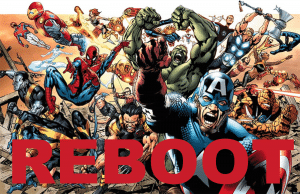Marvel Comics is about to enter into an event called Battleworld. It seems like a combination of the 1980s DC Crisis on Infinite Earths and a gigantic attempt to reboot titles in the Marvel universes with a sprinkling of Secret Wars.
But we don’t need comic reboots.
Now, I am sure there are some good things that will come from this. Miles Morales and Ms. Marvel being on the same Avengers team does excite me. But in the bigger picture, we don’t need comic reboots.
In full disclosure, I am not an every Wednesday comic book purchase guy. The closest thing I have to a pull list is a couple series that I have set to automatically buy from Comixology when they come out. In essence, I am 6 months behind current Marvel things on the Marvel Unlimited app.
But one trend I see over and over is the comic book reboot. A reboot is essentially when comic makers shutter an existing title, start a title with the same characters essentially and try and create a jumping on point.
Why reboot comics?
Sometimes comic reboots are motivated by a new creative team coming on a title, like the reboot of Mark Waid’s Daredevil, where he and Chris Samnee took the character to new places physically (He moved to San Francisco) and in storytelling, as they moved away from a dire, almost über-depressed Daredevil to a long forgotten swashbuckling Daredevil. In essence the reboot in this scenario is to draw attention to the title and get it more attention than if the creators had simply taken on the title at the original numbering point, with the hope being to draw in new readers and boost sales.
Sometimes comic reboots seem to be motivated by a cash grab for people who may have seen the movies that are dominating your theaters now. So, I suspect that right after Age of Ultron’s success in the movie theater, there will be a new issue number 1 of some kind of Avengers title. (I checked. There will be. But with none of the characters from the movie. Uh? What?)
In both the above cases, the idea seems to be:
- Number 1 issues are the best jumping on points and
- Jumping on points are what the audience needs.
In both cases, the approach is wrong minded to build up the comic audience, which is nearly always the argument for the moves.
 My first comic book was bought from a spinner rack at the local Eckerd’s near my house. I picked up Uncanny X-men #193. And let me tell you, as a youngster, I had no idea what I was walking into. In that issue, you have characters introduced. You have an interesting story. You have Professor X dressed in some S&M gear. (Seriously.)
My first comic book was bought from a spinner rack at the local Eckerd’s near my house. I picked up Uncanny X-men #193. And let me tell you, as a youngster, I had no idea what I was walking into. In that issue, you have characters introduced. You have an interesting story. You have Professor X dressed in some S&M gear. (Seriously.)
In the midst of not understanding what was happening, you know what I did next? I went and bought more comics. I discovered there was a comic shop near the college my mom and dad were attending. I busted my tail to earn enough money one summer to buy a longbox of comics that you bought sight unseen. (Scored the Claremont/Miller Wolverine series in that box!)
Later, I went on to memorize the official Handbook to the Marvel Universe. I even won a coveted Marvel No-Prize for pointing out an error in said Handbook. But what I didn’t need was someone to hold my hand and make it easier. And I can’t imagine how much easier it would be in today’s world.
Occasionally I will remember something I loved about a comic from my era and Google it. Then hours later I come up for air, having learned not just all about that, but about stuff related to that. Maybe I even looked up and read some of other issues from that era and beyond.
What do comic reboots mean financially?
Frequently rebooting comics is largely a financial move. I mean, new #1s bring in more readers, right? Well, yes, at first, but the larger trend with the numbers is discouraging.
Take the following two examples. Fantastic Four #611 sold 45,000 issues. When it was relaunched with a #1 issue, sales jumped to 114,ooo, then fell to 58,000 with issue #2, which was still above the 45,ooo before the relaunch.
By issue #16 sales had fallen to 28K and it was relaunched again. This time #1 sold 65K and issue #2 sold only 38K, lower than the original 611 numbering of the comic. The reboot saw diminishing returns to the financial ledger.
Similarly, Wolverine has been frequently rebooted. Wolverine #317 sold 34, 000 copies. The reboot shot #1 up to 117,000 and #2 to 57,000. This lasted for 13 issues, but that reboot only shot the #1 issue up to 88,000 in sales.
To sum this up, second and third reboots are are relaunching poorer than earlier relaunches, plus are crashing faster. This is despite all the marketing and promotional hype that every relaunch receives. It’s almost as if people are taking reboots as opportunities to stop collecting the titles rather than to start collecting the titles.
So what’s the solution to comic reboots?
I know it makes me sound like an old man yelling about kids on my lawn. But we don’t need comic book reboots. We need two things:
- Better stories.
- People willing to share that love for comics with others.
So enough with the reboots; unless someone is launching Power Pack again, at which point you can ignore all of the above.

